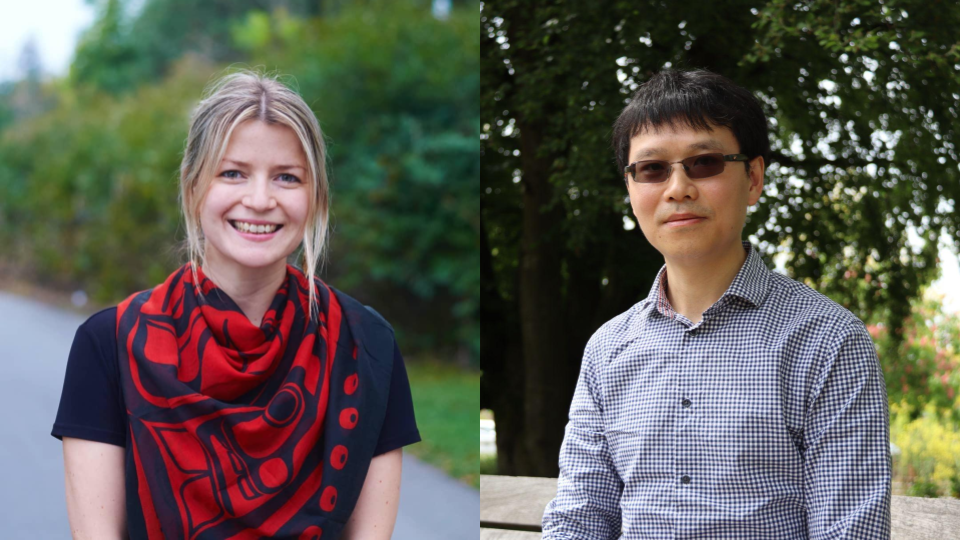New CRCs focus on Indigenous fisheries, machine learning
August 29, 2023

August 29, 2023

Dr. Andrea Reid has been appointed the new Canada Research Chair (CRC) in Indigenous fisheries science—one of four UBC Science faculty members to be newly appointed or have their CRC renewed this week. Also announced was a newly created CRC in machine learning and single-cell analysis, awarded to UBC computer scientist Dr. Jiarui Ding.
Dr. Reid, who heads UBC’s Centre for Indigenous Fisheries (CIF), is a citizen of the Nisga’a Nation and an assistant professor with the Institute for the Oceans and Fisheries. She also received a $125,000 John Evans Leaders Fund for Indigenous fisheries conservation in a changing world.
“Our ambitions are to deliver science that is with and for community partners that responds to their needs and interests,” said Dr. Reid as part of an in-depth article on her work in FOCUS last year. “We've been putting in the work now to understand what those are and begin to build partnerships that are truly equitable, and finding majority Indigenous students to be the leaders on the ground. It's really important to me and to everyone in the CIF that this is not just confined within the university setting.”
Dr. Reid employs community-based approaches and Indigenous research methodologies in her study of culturally significant fish and fisheries. She is guided by a principle and teaching called Etuaptmumk, Two-Eyed Seeing, as envisaged by Mi’kmaw Elder Dr. Albert Marshall. Two-Eyed Seeing is about welcoming many knowledge systems to coexist without one needing to co-opt or fit within another.
Dr. Ding's research focuses on modeling biological data, leveraging knowledge from decades of biomedical research. Driven by his desire to improve the lives of patients by identifying the genes and cells that contribute to diseases such as cancer, his lab’s interdisciplinary research in machine learning and biology has the potential to advance discoveries in human health.
“There are all kinds of molecules inside a cell, so our data could be high-dimensional,” explained Dr. Ding in a profile on joining the computer science department last year. “The central challenge is to extract biological or biomedical information from these noisy, high-dimensional and large-scale datasets.”
The new CRCs are Tier 2 chairs, awarded to exceptional emerging researchers acknowledged by their peers as having the potential to lead in their field.
“Congratulations to these talented recipients from all across the country who are doing the groundbreaking work that will contribute not only to Canada’s health and well-being but also to the world’s," says The Honourable François-Philippe Champagne, Minister of Innovation, Science and Industry. "Through this funding, the Government of Canada is investing in the next generation of researchers and inspiring them to continue to think outside the box and tackle the challenges of today and tomorrow.”
Also announced today were two CRC renewals within UBC Science. Dr. Patrick Keeling, a UBC botanist who investigates the molecular evolution and cell biology of eukaryotes, was renewed as CRC in microbial diversity and evolution. Dr. Leonid Sigal, a UBC computer scientist who focuses his research on problems of visual understanding and reasoning, was renewed as CRC in computer vision and machine learning. UBC Science is home to more than 40 Canada Research Chairs.
We honour xwməθkwəy̓ əm (Musqueam) on whose ancestral, unceded territory UBC Vancouver is situated. UBC Science is committed to building meaningful relationships with Indigenous peoples so we can advance Reconciliation and ensure traditional ways of knowing enrich our teaching and research.
Learn more: Musqueam First Nation